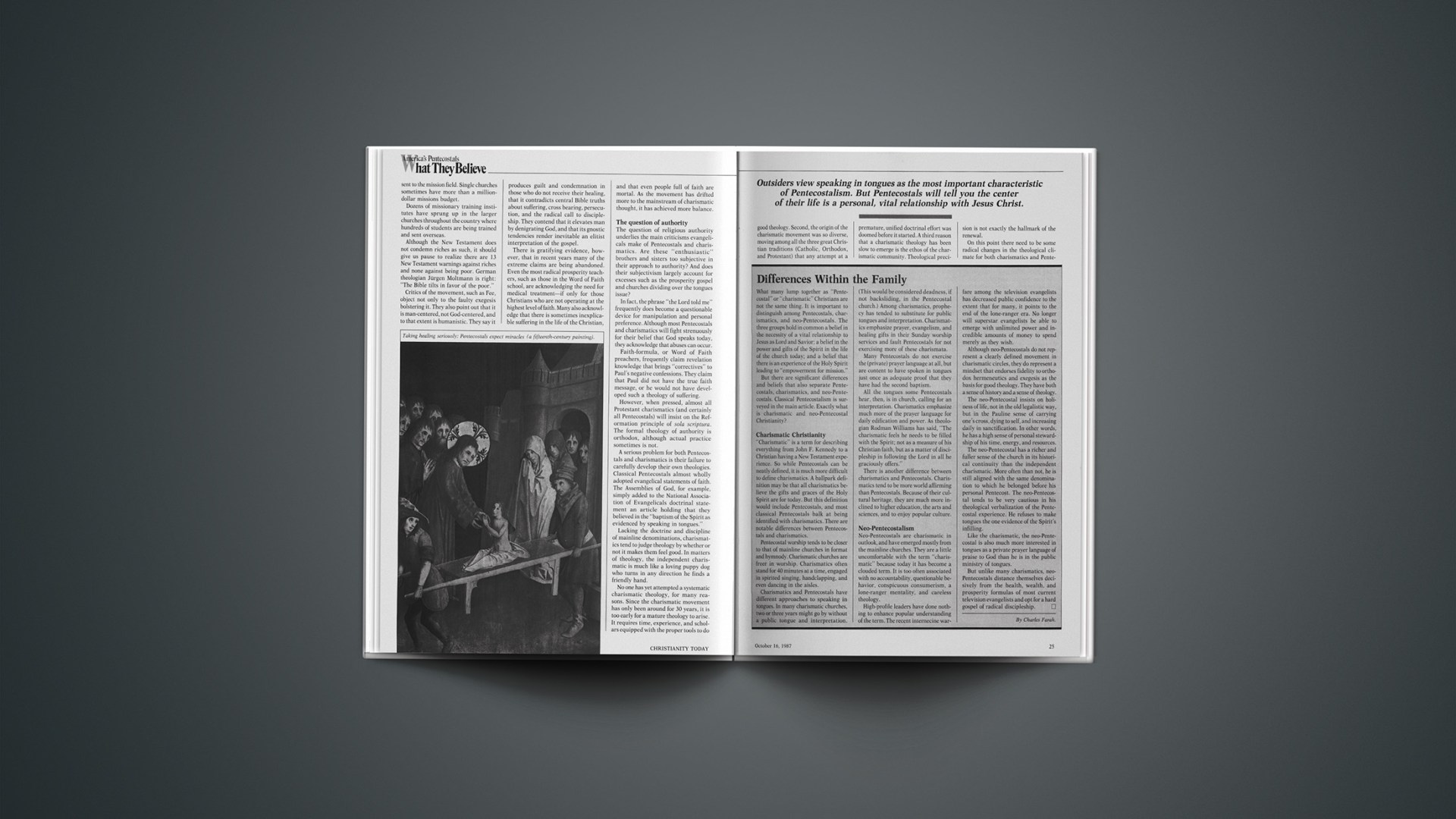What many lump together as “Pentecostal” or “charismatic” Christians are not the same thing. It is important to distinguish among Pentecostals, charismatics, and neo-Pentecostals. The three groups hold in common a belief in the necessity of a vital relationship to Jesus as Lord and Savior; a belief in the power and gifts of the Spirit in the life of the church today; and a belief that there is an experience of the Holy Spirit leading to “empowerment for mission.”
But there are significant differences and beliefs that also separate Pentecostals, charismatics, and neo-Pentecostals. Classical Pentecostalism is surveyed in the main article. Exactly what is charismatic and neo-Pentecostal Christianity?
Charismatic Christianity
“Charismatic” is a term for describing everything from John F. Kennedy to a Christian having a New Testament experience. So while Pentecostals can be neatly defined, it is much more difficult to define charismatics. A ballpark definition may be that all charismatics believe the gifts and graces of the Holy Spirit are for today. But this definition would include Pentecostals, and most classical Pentecostals balk at being identified with charismatics. There are notable differences between Pentecostals and charismatics.
Pentecostal worship tends to be closer to that of mainline churches in format and hymnody. Charismatic churches are freer in worship. Charismatics often stand for 40 minutes at a time, engaged in spirited singing, handclapping, and even dancing in the aisles.
Charismatics and Pentecostals have different approaches to speaking in tongues. In many charismatic churches, two or three years might go by without a public tongue and interpretation. (This would be considered deadness, if not backsliding, in the Pentecostal church.) Among charismatics, prophecy has tended to substitute for public tongues and interpretation. Charismatics emphasize prayer, evangelism, and healing gifts in their Sunday worship services and fault Pentecostals for not exercising more of these charismata.
Many Pentecostals do not exercise the (private) prayer language at all, but are content to have spoken in tongues just once as adequate proof that they have had the second baptism.
All the tongues some Pentecostals hear, then, is in church, calling for an interpretation. Charismatics emphasize much more of the prayer language for daily edification and power. As theologian Rodman Williams has said, “The charismatic feels he needs to be filled with the Spirit; not as a measure of his Christian faith, but as a matter of discipleship in following the Lord in all he graciously offers.”
There is another difference between charismatics and Pentecostals. Charismatics tend to be more world affirming than Pentecostals. Because of their cultural heritage, they are much more inclined to higher education, the arts and sciences, and to enjoy popular culture.
Neo-Pentecostalism
Neo-Pentecostals are charismatic in outlook, and have emerged mostly from the mainline churches. They are a little uncomfortable with the term “charismatic” because today it has become a clouded term. It is too often associated with no accountability, questionable behavior, conspicuous consumerism, a lone-ranger mentality, and careless theology.
High-profile leaders have done nothing to enhance popular understanding of the term. The recent internecine warfare among the television evangelists has decreased public confidence to the extent that for many, it points to the end of the lone-ranger era. No longer will superstar evangelists be able to emerge with unlimited power and incredible amounts of money to spend merely as they wish.
Although neo-Pentecostals do not represent a clearly defined movement in charismatic circles, they do represent a mindset that endorses fidelity to orthodox hermeneutics and exegesis as the basis for good theology. They have both a sense of history and a sense of theology.
The neo-Pentecostal insists on holiness of life, not in the old legalistic way, but in the Pauline sense of carrying one’s cross, dying to self, and increasing daily in sanctification. In other words, he has a high sense of personal stewardship of his time, energy, and resources.
The neo-Pentecostal has a richer and fuller sense of the church in its historical continuity than the independent charismatic. More often than not, he is still aligned with the same denomination to which he belonged before his personal Pentecost. The neo-Pentecostal tends to be very cautious in his theological verbalization of the Pentecostal experience. He refuses to make tongues the one evidence of the Spirit’s infilling.
Like the charismatic, the neo-Pentecostal is also much more interested in tongues as a private prayer language of praise to God than he is in the public ministry of tongues.
But unlike many charismatics, neo-Pentecostals distance themselves decisively from the health, wealth, and prosperity formulas of most current television evangelists and opt for a hard gospel of radical discipleship.
By Charles Farah.










